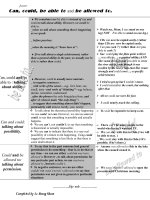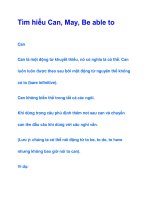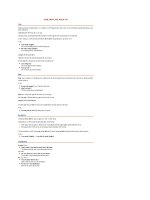Difference between can and be able to
Bạn đang xem bản rút gọn của tài liệu. Xem và tải ngay bản đầy đủ của tài liệu tại đây (11.93 KB, 1 trang )
Difference between can and be able to
Both
can
and
be able to
can be used to talk about ability. In some cases they are interchangeable.
Using can
Can
is used in the present tense. It is used to talk about our ability to do things.
Examples
I can swim.
She can speak English well.
I can swim across that stream.
Be able to
is also possible in these cases; however, it sounds a bit more formal here.
I am able to knit. (Less natural than ‘I can knit.’)
She is able to speak English well.
To talk about our past ability, we use
could
.
Was/were able to
is also possible.
Study the examples given below.
She
could
read when she was three.
OR
She
was able to read
when she was three.
Again, in spoken English, we are less likely to use
was able to.
As you can see in all of these sentences, we were talking about general ability. Things that we
can
or we
could
do
at any time in the present or in the past.
To talk about things that we managed to do on specific occasions in the past, we cannot use
could
. Instead, we
use
was/were able to.
The verb
managed, succeeded (in…ing)
are also possible in this case.
I
was able to
get some really good bargains in the sale. (NOT I could get some really good bargains in the
sale.)
After climbing for several hours, we
managed
to get to the top of the mountain. OR After climbing for
several hours, we
were able to get
to the top of the mountain. (NOT … we could get to the top of the
mountain.)
Both
could
and
be able to
can be used to say that we were not capable of doing something on a specific
occasion.
In spite of climbing for hours, we
couldn’t get
to the top of the mountain.
OR
In spite of climbing for hours,
we
weren’t able to
get to the top of the mountain.
Be first to know when grammar rules change! Sign up to our newsletter here: englishgrammar.org (It's free)
Powered by TCPDF (www.tcpdf.org)









